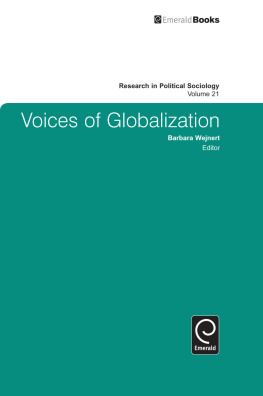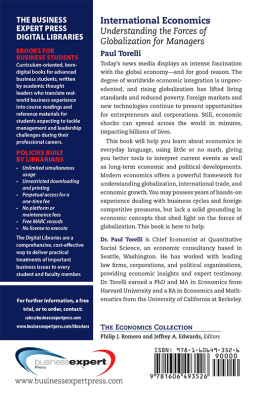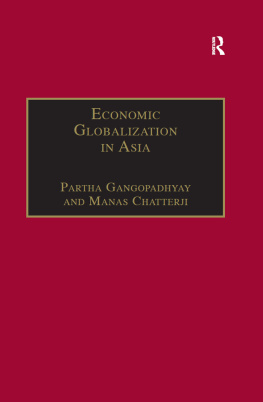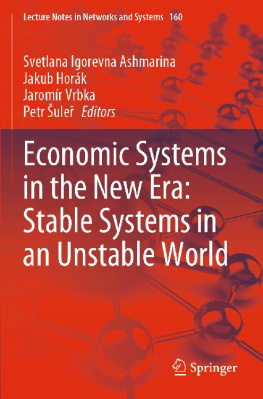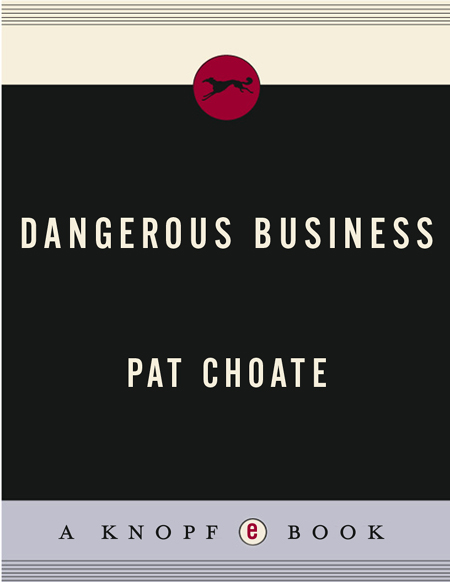
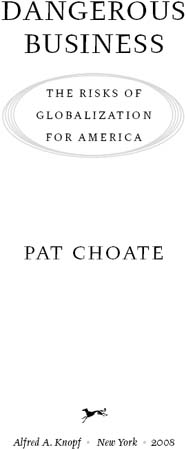
Contents
In Memory
George Becker
Who bravely fought
for the United States
in war and peace
Prologue

The extraordinary enigma we must seek to understand is that despite an expanding economy, violence increases, the number of those living in poverty grows and urban slums spread in cities throughout the world. How is it that our greatest period of technological and scientific achievement has come to endanger the conditions that allow life on earth? There is a growing realization that something fundamental has gone wrong and a pervasive feeling that those in power do not know what should be done.
Sir James Goldsmith, The Trap
A fter the fall of the Berlin Wall in 1989 and before the creation of the World Trade Organization (WTO) in 1995, the toughest geopolitical question the world faced was how to integrate into the global economy the 4 billion people who had long been separated from the West by their political systems, which were primarily Communist or socialist. The solution chosen by the United States, Europe, and Japan is what became known as globalization.
In 1994, months before the U.S. Congress was to vote on ratifying the United States membership in the World Trade Organization, the main institution for globalization, Sir James Goldsmith, one of Europes most flamboyant financiers and a staunch WTO opponent, came to Washington to meet with like-minded people, of whom I was one, in preparation for a similar political battle in Europe.
A citizen of both England and France, a member of the British establishment, an aristocrat who owned a three-star restaurant in Paris, a person who traveled on his own two-bedroom Boeing 757, and a man with three families, Sir James was greeted in Washington with some uncertainty. Our doubts immediately disappeared, however, when we exchanged views with him.
Goldsmiths concern was that an unfettered global trade regime, as envisioned under the World Trade Organization, would shatter the way in which value-added is shared between capital and labor. That agreement has been reached through generations of political debate, elections, strikes, lockouts, and other conflicts. Overnight that agreement will be destroyed. The social divisions that this will cause will be deeper than anything ever envisaged by Marx.
Transnational corporations, he argued in his book, The Trap, would seek the lowest-cost labor in nations with the weakest environmental and worker safety regulations. Those companies would shift as much of their manufacturing as they could, as well as their service work. The interests of these corporations, which owe allegiance to no country, are divorced from those of society.
Surely, he said, it would be a mistake for a nation to adopt an economic policy that would make its corporations rich if they transfer production abroad and eliminate their national workforce but would bankrupt them if they remain and continue to employ their countrys workers. This was the trap.
Sir James and his allies failed to persuade European governments to reject the WTO and create a less ideological, more practical system of global trade, just as WTO opponents in the United States failed.
By joining the WTO, the United States altered its trade policies with other nations radically. The domestic social compact forged among corporations, workers, and society over the prior century was fractured and soon began to shatter. Millions of American workers and the communities in which they lived were left to their own devices. Moreover, those were only the most visible and most immediate consequences of this great policy shift. Which brings us to the subject of this book: the dangers of globalization.
We are now deeply trapped in the world that Goldsmith feared. Millions of American workers are moving from higher-paying jobs with health insurance and pensions to lower-paying positions with no benefits. Lifetime jobs are being replaced with short-term, dead-end work, undermining our middle class. The U.S. industrial base is being hollowed out to the point that the nation is unable to produce domestically the weapons and technologies required for an assured national security. The federal government has gone deep into debt, with foreign owners holding almost half of its obligations. The U.S. trade deficit has soared to more than $700 billion per year. Washington has surrendered, through dozens of trade treaties, its sovereign right to act unilaterally against other nations that violate their trade obligations to the United States. The economies of most developing states, such as Mexico, are so ravaged by these policies that millions of their citizens cannot find work at home and millions have illegally entered the United States in search of jobs. Foreign laborers are being abused in dozens of countries by U.S.-owned corporations to a degree and on a scale that future historians will view as economic war crimes. And as Goldsmith predicted, the global environment is being rapidly destroyed.
These historic changes are neither political accidents nor the consequences of immutable cosmic forces. They flow directly from the policy decisions of our last three presidents and Congress, who year after year have purposefully ignored the outsourcing of American jobs and the resulting decline in U.S. living standards, even as they pursue more open-ended trade treaties while not providing even the most elementary safeguards for American workers and consumers.
The globalization policies of Presidents George H. W. Bush, Bill Clinton, and George W. Bush collectively constitute the worst economic policy mistake in American history. Their policies have enabled leaders of transnational companies and global finance to enrich themselves and advance their interests at the expense of the larger society. These companies and financiers and the campaign funddriven politicians they support are transforming the United States into a corporately governed nation, the mass of whose citizens face an increasingly bleak future.
The challenge we face is to institute a new approach to globalization that will create a broad-based prosperity with stability and economic justice, sovereignty with vision, and security with peace, while not endangering the conditions that allow life on Earth.
The central question surrounding further integration of the world economy (globalization) is not whether the U.S. economy will become ever more entwined with those of other nations, for it will. The issue is how will this be done, by whom, and in whose best interest. This book explores three fundamental questions:
1. Why did the government of the United States, the worlds trading and economic powerhouse, choose to integrate its economy with those of the rest of the world without providing the most basic safeguards for the nation and its people?
2. Can the United States maintain its standard of living, pay its debts, retain its sovereignty, and ensure its national security under its present policies?
3. Can the United States gain the benefits of globalization without plunging into economic ruin?
Introduction

Next page

